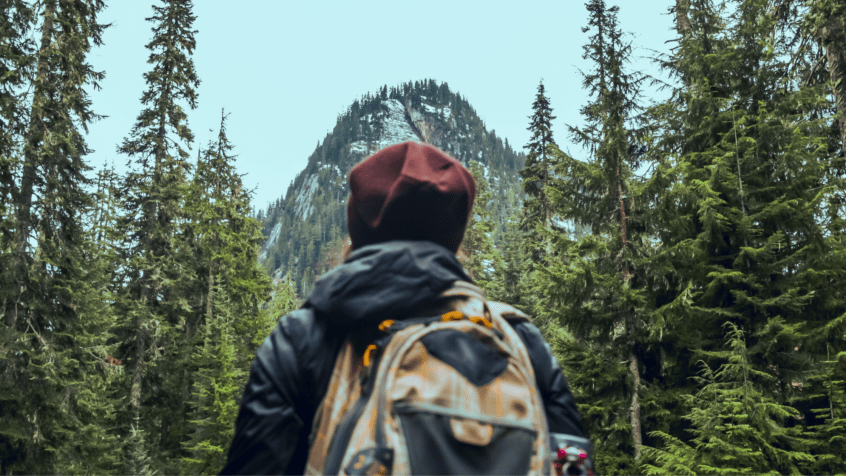Full article with thanks to: cicerone.co.uk/lighten-that-load
Inveterate backpacker and guidebook writer Paddy Dillon warns of the dangers of carrying an over-heavy pack and shares his tips on packing light to make sure you get the most out of your long-distance walk or international trek.
Keen long-distance walkers are happiest walking day after day along trails that take weeks to complete, striding over the hills, spending every night in a different place. There is no better way to experience the rich variety of our landscapes, letting the spirit soar while enjoying the sights, sounds and scents of the countryside. If only it wasn’t for the weight of the pack, the heavy load, slowing the footsteps, sapping fitness and energy, with shoulder straps gnawing into flesh. It’s time to lighten up and offload excess baggage.
I heard about a man who walked the South West Coast Path with a huge pack. It contained five changes of clothing on top of all his camping gear, and it was a tremendous effort to carry it in the hot days of summer. He was overheating so much that he stripped almost naked, wearing only shorts and shoes. In the end he was carrying his entire wardrobe on his back, without wearing any of it. Surely he would have been much better to leave it all at home?
The perils of over-packing
The temptation on any long-distance walk is to over-pack, as insurance against any eventuality on the trail. This may demonstrate that careful thought is going into the overall preparation, but when it doesn’t all fit into your pack, or you can’t lift the pack onto your back, it’s a sure sign that you’re packing too much and it’s time to re-assess.
A heavy pack can cause pain, fatigue and misery, which simply isn’t good enough when the idea is to have fun and revel in the freedom and joy of the great outdoors. Grossly overburdened backpackers shuffle slowly, with heads bowed, oblivious to the splendour and joys of the trail they came to enjoy. By the time they deal with the problem by posting excess baggage home, they are already sporting stresses, strains and injuries that should never have occurred. It seems a shame to spoil a walk with needless suffering.
A big, heavy, bulky pack is a tiresome and awkward burden. Big packs stick in narrow stiles, hit low branches, lodge in doorways, catch you off-balance and will probably clobber your mate at some point. Sometimes it may be funny, but more often it will be annoying, and if you’re unlucky it could cause serious injury. Heavy packs cause the wearer to lean forward, stressing joints, restricting vision to the sight of feet shuffling monotonously onwards.
A small, light pack leaves the wayfarer free to stand up, walk tall and enjoy the trail.
Aim low
Everyone who embarks on a long-distance walk for the first time makes the mistake of getting a big pack, and it is easy to pack more than you need. An average day sack is just about adequate for most trails, and a limit of 35 litres focuses the mind, but it takes time to pack properly. There is no room for bulky fleeces, spare shoes, three changes of clothes, a puffy sleeping bag and a big tent, but there is room for a carefully chosen selection of lightweight, low-bulk gear. If you need to pack food for several days, then a larger pack is required, but maybe five or ten litres of extra capacity will suffice. Modern fabrics mean that bulky clothing is a thing of the past, and no-one needs more than one change of clothing for the evening. All of a sudden that day sack is fine for a month outdoors, sacrificing little in comfort, but losing a lot of weight and bulk.
Clothing
Outdoor clothing comes in all shapes, sizes and colours, but your choice should be determined by performance, ie will it keep you comfortable in the conditions you expect to experience?
On one trail, you may need something that will keep you warm and dry in cold, wet weather. On another trail, you may need something that will keep you cool and protect you from the sun. If you can limit yourself to a single set of clothing for walking, and a lightweight change of clothes for the evening, then it should be possible to give the walking clothes an occasional wash and rinse at the close of a day’s walk. Modern fabrics dry rapidly so should be ready to wear the following morning.
Shop around until you find something that suits you and the conditions you expect to encounter.
Food
Packing food is often people’s downfall. Too much food adds weight and consumes a lot of space. Water weighs a kilo a litre. The lightweight backpacker is easily seduced into packing lots of lightweight dehydrated meals, only to walk past delightful little shops selling wholesome food every day.
The obvious thing is to buy food only when you need it, and pack just enough to get you to the next shop. On most trails in Britain, food can be bought at some point on every day and there is no need to carry excess weight. Buying food on the trail offers the chance to indulge in regional specialities, rather than boiling up the same old mush every evening.
But when following really remote trails with little chance to buy food, you should resort to dehydrated food wherever possible. The choice is wide these days and prices vary enormously, so it is worth shopping around. Don’t just look at the specialist ‘trekker’ fare, because supermarket shelves often carry a decent, more affordable selection.
A burden shared
Don’t forget about your companions, if you’re not trekking on your own. A burden shared is a burden halved and there are always economies of scale. A tent for two is lighter than two tents for one. You’ll still need two sleeping bags, but you won’t need two stoves, and with co-ordinated planning you can both carry much less than if you travel alone.
Lightweight gear
The last, and most expensive, option is your gear. Any amount of money can be spent on lightweight, low bulk, high performance kit but if finances are tight you may decide to replace items over several years, as they wear out. However, lightweight tents and sleeping bags tip the scales at less than a kilo each and squash down very small so are well worth the investment. Read gear reviews and quiz retailers mercilessly.
Ultra-lightweight backpackers say every item of gear should have two uses, so roll up your clothes to make a pillow and use a cooking pan as a mug. Some tents can be erected with trekking poles, so the tent poles can stay at home.
An ultra-lightweight backpacker once lifted my pack and had to confess that I was carrying a little bit less weight even than he was – so I’ve learned a thing or two in my many years researching the trails of the world for articles and guidebooks. In the end, it’s your choice how to shed the weight, but it’s definitely worth the time to reconsider the contents of your pack to make sure you get maximum pleasure – and minimum pain – from your time on the trail.
Be critical of gear, even hyper-critical, but beware of getting to the stage where you peel the price labels off your soup packets!
Full article with thanks to: cicerone.co.uk/lighten-that-load
We offer an extensive range of adventures in the UK like our Guided Walks, Wild Camping Weekends, Guided Centre-based Walks, Backpacking Weekends, Guided Mountain Walks and much, much more! As expert adventurers, we’ve designed awesome adventure courses like Winter Hill Skills, Navigation Skills and we offer Private Courses too. Plus, we’re an accredited assessor for the Duke of Edinburgh Award Scheme and can assess Bronze, Silver and Gold Expeditions.
If you choose us for your next adventure – you’ll learn new skills and have plenty of fun!
Simply check our online calendar to book your next awesome adventure.

